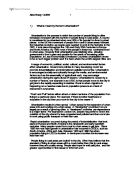There was an increased demand for coal as well as steel. Miners spent hours underground collecting the coal. Coal was also used as the main fuel in iron making, brick making, brewing and soap boiling. By 1830 some mines were over 300metres deep.
In 1700 power was provided by human muscles, animals (horses, mules and oxen), water mills and windmills. During the 18th century a much more reliable form of power was perfected: the steam engine. By 1775 over 100 of the machines, that Thomas Newcomen had built to drain water from tin-mines in Cornwall, were at work in coalmines in Northumbria. But Newcomen’s engine used huge amounts of coal and could only be used for pumping water. In the 1880s Thomas Edison built the world’s first power station for generating and distributing electricity. American and Germany were quick to use this, but Britain was slow to change as they still mainly used steam power, and only really changed in the 20th century.
Most people and goods in the 18th century were transported by road on horses, packed-horses, carts or stagecoaches. The industry needed better roads. It had to gain more raw materials, like coal, iron ore and wool – to workshops and factories. It also needed to get finished goods as well, like cloth to its markets. From about 1810 better roads brought a boom in stagecoach travel. A journey from London to York, which took 5 days in 1750, took only 1 day in 1840. Coaching came to an end in 1840, and was replaced by more efficient and reliable transport such as canals and the railways. Gottlieb Daimler built the first petrol drive car in 1883, which revived the transport with better road surfaces invented by men such as John Macaden. Rail had longed been used to carry heavy vehicles. It had always been the fastest way of travel. The railways always helped industry to take goods from one place to another. The railways were always a much more efficient mode of transport than the canals, so like the coaches they died out as well. The railways also provided jobs – 90,000 jobs in railway maintenance.
When people first built factories there were few regulations about working conditions. Some employers took advantage of this. There were complaints about working conditions, but there has always had been. There were also concerns about child labour, although children had always helped their parents in workshops and fields. The main concerns were the dangers to health in the factories and mines; noise, heat, overcrowding and exploitation of women and children. Women were usually paid half and children a third of a man’s wage. So many employers were tempted to use women and children to do work more suited to full-grown men. Another complaint was the loss of independence. The factory bell and the relentless machines now ruled the lives of workers who had been used to controlling their own hours and methods of work.
Poorer people, who were unable to support themselves or their family, had been able to turn to the parish magistrates for poor relief. They were called paupers. In 1834 the poor law amendment act was passed. The act was largely the work of Edwin Chadwick. It said that magistrates should try to abolish all poor relief except the workhouse. The amended law became known as the new poor law. It remained in force for the rest of the century, though it was never possible to enforce it fully.
Between 1801 and 1851 the population of Britain doubled from 10.5 to about 21 million. Industrial towns grew even faster, so fast that the living conditions became unbearable. Overcrowding was one problem; houses were too close together. The water supply was another problem; the homes of the poor had no taps so they had to use the public water, which was extremely dirty. Sewage and rubbish disposal were main problems as well, because the sanitation in Britain at this time was poor. Of course not everyone lived in the city, the countryside was much cleaner and safer.
Health was a major problem. Infectious disease thrived through towns. In 1840 one in six children died before their first birthday, one in three before they reached 5. Typhoid was spread in infected water; bacteria coughed into the air carried tuberculosis, typhus was a virus spread by lice. In 1831 a new killer disease appeared: cholera came into Sunderland from abroad. Better medical treatments happened in 1847 by Dr James Simpson who had developed chloroform as an anesthetic for surgeons to carry out more complicated operations. A mixture of new laws and medical progress started to reduce the worst of the health problems in the towns.







